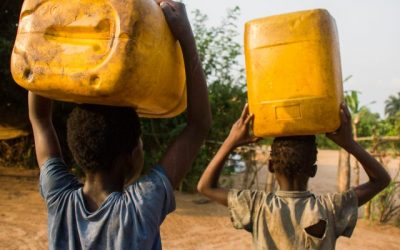Water, Sanitation & Hygiene
Bringing improved water sources, latrines and hygienic practices to the most remote communitiesWASH in the DRC
DRC is the most “water rich” country in Africa yet, in rural locations where ASSP works, only 32% of the population is able to access potable water and 17% benefit from suitable water and sanitation devices (EDS, 2013). The lack of adequate available water and sanitation creates a ripple of impacts on the population. Most seriously, water-borne diarrheal diseases drive alarming rates of child mortality, causing an estimated 17% of all child deaths.
IMA aligned with the DRC National Framework of Clean Schools and Villages Program (CSVP) and is committed to sustainably promote better hygiene, sanitation practices, and increase clean drinking water availability in assisted communities. IMA is promoting a mixed approach that involves water and sanitation interventions. This is a community-driven approach and seeks community empowerment and develops capacity in community self-evaluation for development activities.
1,829
WASH infrastructure projects completed from 2013 to 2019
Our Approach to IMproving WASH in the DRC
ASSP increased access and use of potable water and hygienic sanitation by constructing water infrastructure such as community rainwater collection cisterns at health centers, new protected water points, wells with solar water pumps, and distributing toilet tiles for latrine construction to improve access to sanitary elimination.
Key Achievements
clean schools
ASSP supports healthy school programs in 28 health zones. In the last year certified schools increased from 16 to 41. As part of this process toilets and 12,000 liter water cisterns were built to provide water and sanitation for over 20,000 students. A community water filter was also provided to each school.
safe drinking water
327,454 people have been provided with access to safe drinking water sources
infrastructure
In an effort to improve hygienic conditions in health centers, ASSP launched its Centre de Santé Assaini, or Sanitary Health Center program. To date 1,829 WASH infrastructure projects have been completed at assisted health centers, providing the means to keep these centers safe and clean.
adequate sanitation
304,975 people were provided with access to adequate sanitation
COVID-19 Response
As part of IMA’s Covid-19 response efforts, IMA and its partners distributed:
2,172 bottles of liquid soap;
535 handwashing stations;
480 water filters;
890 garbage containers; and
6,950 garbage bags.

Clean Village Program
ASSP’s WASH program implemented a certification process for communities to improve sanitation and hygiene in their villages. In order for a village to be certified “sanitary”, they must have a dynamic and existing village committee, 80% of the population must have access to drinking water, hygienic latrines, and proper methods of garbage disposal, 60% of the population must wash their hands with soap before eating and after being in the toilet, and 70% of the population must know the routes of transmission of waterborne diseases and how to prevent them. Also, the village must be cleaned once per month.
Villages certified Clean


Increasing Access to Health Care
Read more about how ASSP is contributing to improved health by increasing access to health care.
Learn more about our work to provide safe water in the drc
Publications

Water, Sanitation, and Hygiene
Pilot Initiative: Water ATMs in DRC - June 2022 (pdf)
WASH Program Brochure – September 2019 (English version) (version française)
ASSP’s WASH Program Certifies its First Round of Healthy Villages
The Democratic Republic of Congo (DRC) is one of the most water-rich countries in the world,...
QUICK CONTACTS
Recent Posts
Quarter 1 Results
Number of pregnant women who received three doses of IPT while attending antenatal care: 58,495Number and percentage of 1-yr-old children vaccinated against measles: 78,123Number of Couple Years of Protection (CYPs) achieved through family planning service provision:...
Saved by my Son: A Tushinde Ujeuri Success Story
"The support from the Tushinde program has restored my will to live." Tushinde Ujeuri Project brings hope to one survivor of sexual and gender-based violence in DRC It was mid afternoon, and my 10 year-old son and I were walking home from working in the fields. When...
Combatting Malnutrition in DRC: A Nutrition Success Story
Community relays in Ndesha, Kasai Central are successfully combatting malnutrition in the DRC thanks to ASSP's nutrition training. Combatting Malnutrition One Maman at a TimeMado Betu was a young child of two years and four months but was frail and unable to walk when...



